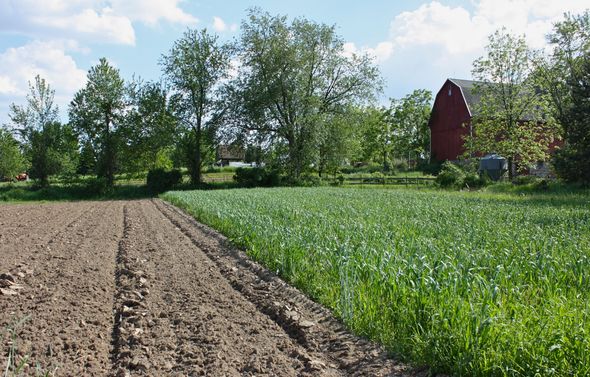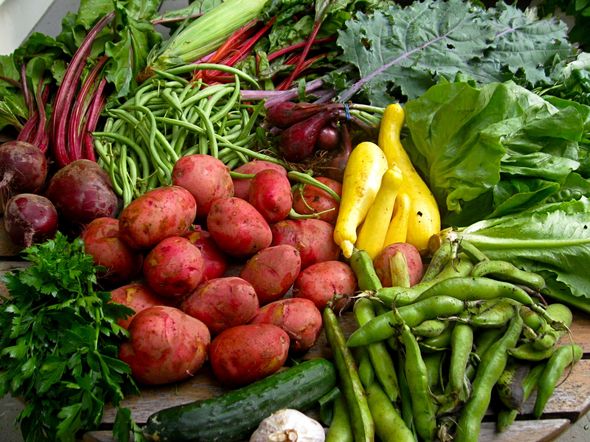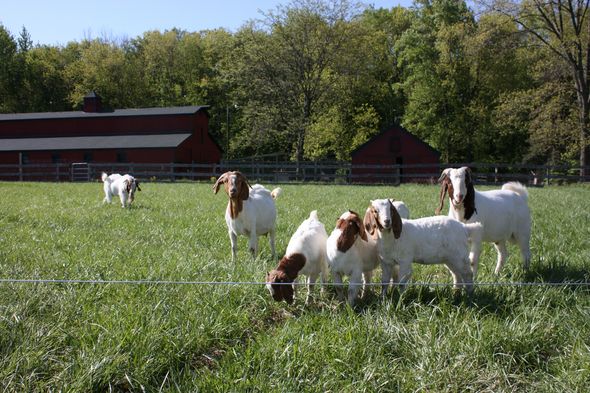Choosing your CSA farm share for 2011

Community Farm of Ann Arbor, started in 1986, one of the first CSA farms in the U.S.
Contributor | Kim Bayer
Calling all food patriots: "Oh, Say Can You CSA” (a phrase coined by AnnArbor.com's Corinna Borden) might be the new national anthem for what’s being called the "Good Food Revolution." For people who want to eat food that is good for them and good for the planet, the most direct route is to get your food directly from a farmer you know and trust. As a bonus, it's usually less expensive than the same thing would be in a grocery store or at the farmers' market. And lots of people say: "It's a way to make sure I'm eating my vegetables."
In case you haven't heard of it before, Community Supported Agriculture or a CSA farm share is generally a weekly box of vegetables in season (usually May-October) from a local farm, for which you pay in advance. At a practical level, you’re giving a farmer a vote of confidence and some security with startup capital. In return, you get a discount on your produce. Together you share the risks and rewards of the season.
The good news for those of us in Washtenaw County is that there are almost two dozen CSAs from which to choose and probably an equal number of farms that provide locally raised (and pastured) animals for meat. There are so many CSAs now that I've started offering a "CSA Matchmaking Service" to help people choose the farm(s) that best match their needs (email me for more information), and I've put together some guidelines for what to look for when you're making your choice.
Once you’ve signed on to your farm membership, what you can usually expect is to have a certain day each week (which you will know in advance) where you’ll go pick up a box of fresh, seasonal produce (though there are starting to be some delivery options too.) Many of our local CSAs bring their members’ shares to the Ann Arbor Farmers' Market on Saturdays. You just need to remember to get there before the farmer packs up and goes home! Most of the CSAs will give you (or email you) a newsletter to let you know what’s in the box, and may include recipes and upcoming events.
In addition to the many produce CSAs, with their weekly boxes of gorgeous, fresh, seasonal foods throughout the summer, there are also some wonderful, innovative CSAs incorporating more than just vegetables. For example, the Harvest Kitchen with its prepared foods CSA, along with CSAs offering humanely raised and pastured meat (Old Pine Farm) or chickens and eggs (Two Creek Organics), locally grown frozen fruits and vegetables (Locavorious) and even a "kraut club" (from The Brinery). It's getting to be like CSA heaven around here! And there are a variety of models for participation including: subscription, shareholder and shopper's choice.

Tantré Farm - what's in the box in July
Contributor | Kim Bayer
If you want a weekly box of locally grown produce this summer, the end of winter is the time to figure out which CSA best matches your needs and then get your application (usually available on the farm website) submitted post haste. CSAs fill up around here!
Consider these criteria when making a choice for the CSA you'd like to join:
• Type of CSA organization: Most typical is the Subscription model (pay a lump sum up front, get a weekly box of vegetables chosen and packed for you). But there is at least one Shareholder farm (which is like the Subscription model, but with greater involvement in decision making and farm process) and at least two Shopper's Choice farms (pay upfront, choose weekly which produce you want) out there as well.
• Growing Practice: The main differentiators in growing practice are those based on: Conventional Agriculture; Certified Organic Agriculture; or Biodynamic/Organic Practice (for farms that are not certified organic, but either in transition to organic certification or in philosophical alignment with the tenets of organic agriculture and beyond organic). Even if a farm is certified organic and says so, you'll want to ask about this and investigate for yourself.
• What size share: Most CSAs offer a share that feeds a family of two adults and two children for a week as the standard. Some options you’ll see include: whole, half, family, individual, senior, standard, large, every other week, etc. Generally you have to ask about this. Consider getting contact information for someone who has previously been a member to check on quantity and quality of the food. If it’s too much food, you can always split your share with friends or neighbors too — they will enjoy the benefits.
• What season/how many weeks: Most produce CSAs seem to have a 20 week season that lasts from June through October. Some offer full season and half season shares. In my research it seems the season for local CSAs may be anywhere from 10-26 weeks. And several are now also offering extended season shares into the winter and spring.
• Price per week: When comparing cost and value among CSA shares, it's most helpful to figure out the cost per week. There is a huge variation in the length of CSA seasons and the amount of food, so cost per week gives a more accurate basis for decision making. Most CSA shares cost in the range of $20-$40 per week. One advantage of splitting a share with neighbors or — it costs half as much. We pay $15 per week for our half of a split share of just-picked organic vegetables that are of a quality that we could not buy in any store. I can't think of anything that's a better value for us.
• Does the farm specialize in something? Do they grow exotic salad and multi-ethnic greens, or mostly standard "meat and potato" produce? Some CSAs are very greens-intensive, some consciously plant very few greens, some let you choose all your own produce. Check for your preference.
• Pickup time and location: Many (but not all) CSA farms offer pickup at the Ann Arbor Farmers' Market on Wednesday or Saturday and also offer pickup at the farm on specific days. Cost is often less for farm pickup. Your week will revolve around this pickup time, so choose one that gives you time to put all those vegetables away. You will also want to ask what the policy is if you cannot make a pickup time — in general you are responsible for making any alternate arrangements if you can’t pick up.
Additional considerations:
Think about whether you’re interested in farm visits and special events: Many CSAs have opportunities to visit the farm on member work days, or have cooking classes, farm tours, potluck dinners, music festivals, kids' day camps, etc. Most farms are very happy to have members volunteer their time in any capacity — they all need extra hands and help. Visiting the farm, especially if you have kids, is a great way to see with your own eyes where your food comes from and what goes into making it happen.
Many farms welcome visits and connections with open arms. One farmer says of members stopping by: "We get a lot of benefit from a social standpoint because we get to see people, and they get a lot of benefit because they get to connect with the land. We’ve got small children and we get a lot of joy from having people visit.”
In conclusion:
I've talked to a lot of CSA farmers lately. Most seem to be doing well, expanding their memberships and their farms. This year we have even more choices than last year, as new farms broke ground and put up hoophouses over the past year.
I heard again and again how seriously farmers take the responsibility of providing the highest quality produce every week; of the creativity, planning, skill, and flat out labor that goes into those CSA boxes. We are very fortunate to have so much talent and good food so close to us.
Even with some of the richest land in the state, Washtenaw County spends less than 1 percent of its estimated $1 billion food budget on food that is grown in Washtenaw County by local farmers. By becoming CSA farm members, we can do something very directly to change that — and eat the freshest, most delicious food too. Becoming a CSA member is transformative in many dimensions.

Capella Farm's Boer Goats
Contributor | Kim Bayer
I'd encourage everyone who eats to go out and visit the beautiful farms in our area, brought to life through the care of some of the most hard working people you’ll ever meet. As a CSA member, it's a wonderful feeling to be able to give warm thanks to the person growing the food for your table — once you know your farmer.
Produce CSAs
Beautiful Earth Family Farm
Brines Farm
Capella Farm
Carpenter's Greenhouse and Organic Produce
Community Farm of Ann Arbor
Down on the Farm
Frog Holler Organic Farm
Green Things Farm
Living Stones Farm
Needle-Lane Farm
Our Family Farm
Portage River Farm
Pregitzer Farm Market
Prochaska Cooperative Sharing Program
Sunseed Farm
Tantré Farm
Two Creeks Organics
Valley Family Farm
Zilke Vegetable Farm
Beyond Produce CSAs
The Brinery
Harvest Kitchen (prepared dishes)
Locavorious (frozen fruits and vegetables)
Old Pine Farm (humanely raised meat)
Kim Bayer is a freelance writer and culinary researcher.


Comments
Diana Dyer
Fri, Mar 30, 2012 : 2:06 p.m.
Adding a specialty CSA to the list - The Dyer Family Organic Farm, which specializes in garlic (Dick's 'Pretty Good!' Garlic) is starting a Garlic CSA for 2012. A full share will include green garlic, garlic scapes, 24 of the best of our 40 varieties of garlic, a garlic braid, honey, and special on-farm events. For more info and a brochure, please send an email to prettygoodgarlic@gmail.com, www.dyerfamilyorganicfarm.com
Amy Heath
Wed, Apr 6, 2011 : 11:41 p.m.
Living Stones Farm, LLC offers partial and full shares at competitive rates. We will deliver to your workplace if you recruit four other members for a total of five shares to one location. Additional pick up sites are available. Go to <a href="http://www.livingstonesfarm.org" rel='nofollow'>www.livingstonesfarm.org</a> for registration and more information.
Gillian Ream
Thu, Mar 31, 2011 : 1:52 p.m.
oh dang I forgot the name - it's The Family Farm (not to be confused with Our Family Farm) in Belleville, although they have drop offs in Ann Arbor and Ypsi.
Gillian Ream
Thu, Mar 31, 2011 : 1:51 p.m.
Great list kim! I just found my CSA match at the Local Food Summit and thought I'd add it to the list - it's a new one! and one of those awesome women-run farms we've been hearing so much about! It's a biodynamic farm and they include eggs and honey in their shares. their website is still getting sorted, i think, but here is their facebook page: <a href="http://www.facebook.com/pages/The-Family-Farm-Belleville-MI/132844250102742?sk=info" rel='nofollow'>http://www.facebook.com/pages/The-Family-Farm-Belleville-MI/132844250102742?sk=info</a>
Ben Connor Barrie
Fri, Jan 28, 2011 : 9:23 p.m.
My housemates and I went with Sunseed's fall CSA and we were so pleased that we are current doing their winter CSA. Their vegetables are super tasty. My housemate Quinn wrote up a piece on her experience research and ultimately selecting a CSA: <a href="http://damnarbor.blogspot.com/2010/11/guide-to-ann-arbor-how-to-find-your.html" rel='nofollow'>http://damnarbor.blogspot.com/2010/11/guide-to-ann-arbor-how-to-find-your.html</a>
Edward Vielmetti
Fri, Jan 28, 2011 : 4:35 p.m.
Here's a photo set with a year's worth of Needle Lane Farms CSA: <a href="http://www.flickr.com/photos/andreaz/sets/72157624284751484/" rel='nofollow'>http://www.flickr.com/photos/andreaz/sets/72157624284751484/</a> Lisa Allmendinger notes Pregitzer Farm Market LLC (Munith) <a href="http://www.yourfarmmarket.com/" rel='nofollow'>http://www.yourfarmmarket.com/</a> She bought an every other week share last year from Wade Pregitzer (pickup is at the Wednesday Chelsea Farmers' Market at Chelsea Community Hospital) or on Thursdays at the Westgate Shopping Center market and plans to buy a half share this year.